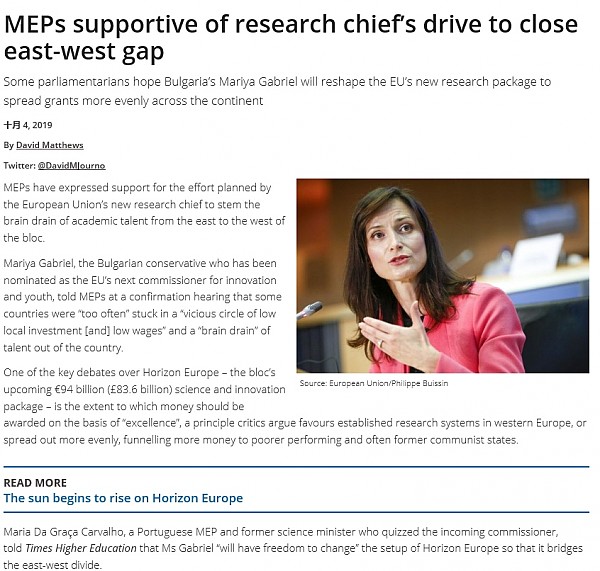Press MEPs supportive of research chief’s drive to close east-west gap
Some parliamentarians hope Bulgaria’s Mariya Gabriel will reshape the EU’s new research package to spread grants more evenly across the continent
By David Matthews
MEPs have expressed support for the effort planned by the European Union’s new research chief to stem the brain drain of academic talent from the east to the west of the bloc.
Mariya Gabriel, the Bulgarian conservative who has been nominated as the EU’s next commissioner for innovation and youth, told MEPs at a confirmation hearing that some countries were “too often” stuck in a “vicious circle of low local investment [and] low wages” and a “brain drain” of talent out of the country.
One of the key debates over Horizon Europe – the bloc’s upcoming €94 billion (£83.6 billion) science and innovation package – is the extent to which money should be awarded on the basis of “excellence”, a principle critics argue favours established research systems in western Europe, or spread out more evenly, funnelling more money to poorer performing and often former communist states.
The sun begins to rise on Horizon Europe
Maria Da Graça Carvalho, a Portuguese MEP and former science minister who quizzed the incoming commissioner, told Times Higher Education that Ms Gabriel “will have freedom to change” the setup of Horizon Europe so that it bridges the east-west divide.
Although a plan to equalise salaries for grantees across the EU has been dropped, it has been suggested that more money should be made available to allow researchers in weaker performing countries to “hop on” to existing projects, allowing them to break into existing academic circles.
“[Ms Gabriel] made very clear that excellence is the criterion but...there is a lot to be done so that Horizon Europe is able to capture excellence where excellence is” and not just in the “very well-known institutions”, said Ms Carvalho.
Despite an initial agreement in Brussels on the broad shape of Horizon Europe earlier this year, “there are still open questions” about how it will actually play out, Ms Carvalho said.
“To have a successful programme we need to have our member states happy with the programme,” she argued. “There are top researchers in Poland and Romania. It’s a pity for Europe that they are not involved in the scientific programme.”
Ivars Ijabs, a Latvian MEP and a member of the EU parliament’s industry, research and energy committee, told THE that he had “no reason not to believe her that this is going to be a priority”.
But member states had to play their part in catching up too, he said, and Horizon Europe should encourage this by making some cash conditional on “promoting reform and investment”.
Henna Virkkunen, a Finnish MEP, warned that Horizon Europe has to be “based on excellence” and that the shape of the programme was already quite fixed.
In Finland, which joined the EU in 1995, “in the first 10-15 years we were not very successful in these research programmes because we did not have the expertise and the contacts”, she said, but now the country’s universities were “much more active”.
The research gap was not just a question of east and west, said Ms Carvalho. There was also a gulf between countries in the north and south of the continent, as well as within nations.
During her grilling by MEPs, Ms Gabriel also said she supported their calls for a higher Horizon Europe budget – which still ultimately depends on the EU’s wider financial wranglings and Brexit.
